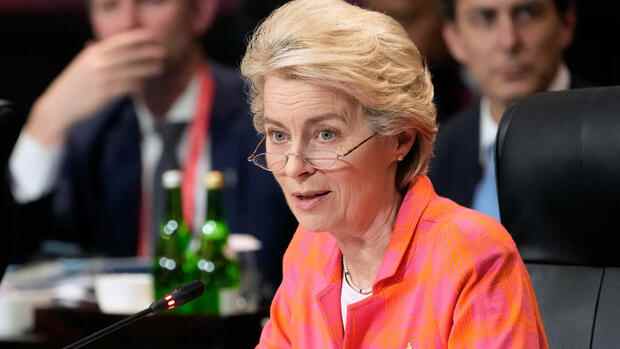Brussels A term from the logic of nuclear deterrence is finding its way into European trade policy: counter-strike capacity. Before the end of this year, the EU intends to pass a law that would allow it to punish other countries’ attempts at economic blackmail with sanctions.
The project in Brussels is described as an “instrument against economic coercive measures” or “anti-coercion instrument”.
The Commission presented its proposal a year ago, and the Member States have now agreed on a position. The current draft law has been submitted to the Handelsblatt and is to be adopted by the EU ambassadors this Wednesday.
In the next step, the document must be brought into line with the ideas of the EU Parliament. If all goes well, the legislative process could be completed this year.
Europe wants to prepare for trade wars. In the new draft, the EU member states argue that attempts at blackmail “where a country imposes barriers to trade or investment” violate international law. An “effective, efficient and rapid reaction by the Union to economic coercion” is therefore necessary.
In recent years, EU countries have repeatedly come under pressure from foreign powers. A recent example is Lithuania, whose companies are being boycotted over a dispute with China over the name of the Taiwanese representative office in Vilnius. According to the Europeans, the trade conflicts with the USA during Donald Trump’s presidency have also shown that the EU needs to upgrade its trade policy.
>> Read here: Australia’s ex-PM warns of losing all foreign investment in China
The mere existence of the new retaliation option is intended to prevent other countries from being tempted to engage in economic and political aggression against Europe. In principle, it is about creating a balance of terror with the possibility of a counterattack – analogous to the Cold War.
“The aim is to prevent countries from restricting trade or investment or threatening to do so in order to change EU policy in areas such as climate change, taxation or food safety,” explains the European Commission. According to the draft law, the counter-sanctions can affect both companies and individuals who were involved in the measures against the EU or one of its members.
However, the EU states have weakened the original proposal at a crucial point. In order to prevent the Commission from increasing its powers, they insist on imposing the counter-sanctions themselves. Not unanimously, but with a qualified majority.
The current draft law states: “The implementation powers should be transferred to the Council.” This is where the member states are organized, who also want to reserve the option of changing the sanctions proposed by the Commission.
The national governments fear diplomatic upheavals
The reason member states are asking for a say is that the lines between trade and foreign policy are blurring. Trade policy is the sole responsibility of the Commission, while foreign policy is the responsibility of the Member States.
National governments fear that economic retaliation by the EU will lead to diplomatic upheaval. They therefore want to be involved in the decisions.
From the Commission’s point of view, however, it is problematic to leave the decision to the Member States. For conflict-ready countries like China, this gives them the opportunity to influence individual EU countries and prevent a qualified majority in the Council.
This makes it less likely that the counter-sanctions can be imposed at all, as can be heard from the Commission: The deterrent effect of the instrument, the actual purpose of the project, is weakened in this way.
The Czech Council Presidency wants to get the project through by Christmas
This criticism also comes from the EU Parliament. “The instrument will only have deterrent potential if we as the EU speak with one voice,” says Bernd Lange, Chairman of the Trade Committee. If Europe could be split, “the system will become unusable”.
It is therefore “extremely important that we maintain a European approach”. The aim must be to enable the EU to “stand up for its own interests more confidently on the world stage”.
The EU Parliament hopes for a speedy agreement with the member states. The Czech government, which currently holds the Council Presidency, also wants to pass the law before Christmas. “But the details in the law have to fit,” warns Lange, “there’s still a lot of work ahead of us.”
More: Bare teeth: Europe is launching an economic counterattack
